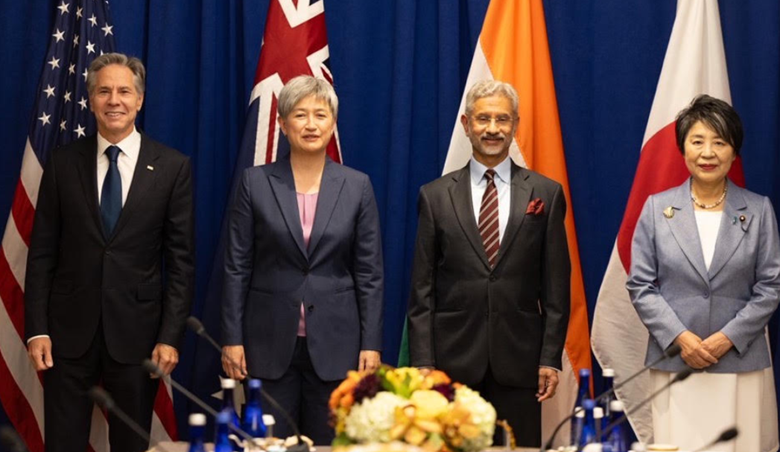Quad Foreign Ministers Meet in New York , Aim to Deepen Quad Cooperation in the International System

The Foreign Ministers
of the Quad countries; India’s External Affairs Minister S. Jaishankar, U.S.
Secretary of State Antony Blinken, Australian Foreign Minister Penny Wong, and
Japan s Foreign Minister Yoko Kamikawa met on the sidelines of the 78th United
National General Assembly in New York. They reaffirmed their support for the
United Nations Charter and a rule-based order. The four leaders also reiterate
their commitment to a free, open, and inclusive Indo-Pacific and seek further
to deepen the Quad cooperation in the international system. In a joint readout,
they reiterated advancing the Quad leader’s vision of establishing an
Indo-Pacific region that is "peaceful and prosperous, stable and secure;
free from intimidation and coercion, that opposes the use of force to change
the status quo," held in Hiroshima Summit in May 2023. The F.M. also
showed their support for the U.N.’s Sustainable Development Goal (SDG), which
aims at social, economic, and environmental development for all countries and
to achieve and implement the 2030 agenda. The Quad is a non-military grouping
of four democracies-India, Japan, the U.S., and Australia, originally formed
and collaborated with disaster relief assistance and management during the
Indian Ocean Tsunami 2004. The Quad countries have been working with a diverse,
multidimensional, and practical approach to advancing the vision of a free and
open Indo-Pacific. Quad’s working groups
are on climate, global health security, emerging technologies, cyber, space,
and Infrastructure. The four leaders in the New York meeting said, "The
Quad’s practical action in the Indo-Pacific is advancing the 2030 Agenda for
Sustainable Development and its SDGs by delivering sustained economic and
social value that is responsive to regional partners." Furthermore, they
underscored the effectiveness of institutions and reaffirmed their support for
regional architectures and organizations like ASEAN’s unity and centrality, the
Pacific Islands Forum (PIF), and the Indian Ocean Rim Association (IORA).
Interestingly,
at the time of the U.N. assembly where the United Nations Security Council is
divided over the Russia-Ukraine war and is not able to reach any consensus to
end the war, Quad Foreign Ministers highlighted their commitment to a
comprehensive U.N. reform, including increasing seats of permanent members and
non-permanent members. While emphasizing the importance of the U.N. charter and
international law, they expressed their deep concern for militarizing the
disputed territories, extremist activities, and terrorism in the Indo-Pacific
region. The ministers strongly voiced their concerns about the humanitarian
crises in Ukraine, the political and humanitarian crises in Myanmar, and North
Korea’s nuclear proliferation.
To
sum up, The Quad countries have collaborated multilaterally and aim to deepen cooperation with like-minded countries to provide practical solutions for global challenges that benefit the Indo-Pacific region and beyond.
Author’s Bio:
Dr. Indu Saxena is a senior expert and fellow at the Consortium of Indo-Pacific
Researchers. She writes on U.S. India Relations, South Asia, and Indo-Pacific
Security.